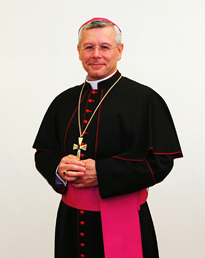by frival
on October 13, 2011
 Parable Magazine, the magazine of the Diocese of Manchester, has a regular column “Ask Fr. Kerper” wherein people can ask a priest questions to which they’ve never gotten answers. In the September/October edition Fr. Kerper addressed the question, “Why does everyone do something different at Mass?” He addresses the Sign of Peace, holding hands during the Our Father and the Orans position for the laity and does so in a way that lines up with everything I’ve read from Church authorities. That only sounds unexpected if you haven’t visited the many parishes throughout this Diocese where these practices are well out of line with all those recommendations – indeed I can’t remember a single parish (not that I’m particularly widely traveled, but still) where at least one of the above wasn’t at least a little sideways compared to what the Church recommends. Once upon a time it really bothered me; for the most part now I sigh and chuckle – it is, indeed, in the words of James Joyce “the Church of here comes everybody”.
Parable Magazine, the magazine of the Diocese of Manchester, has a regular column “Ask Fr. Kerper” wherein people can ask a priest questions to which they’ve never gotten answers. In the September/October edition Fr. Kerper addressed the question, “Why does everyone do something different at Mass?” He addresses the Sign of Peace, holding hands during the Our Father and the Orans position for the laity and does so in a way that lines up with everything I’ve read from Church authorities. That only sounds unexpected if you haven’t visited the many parishes throughout this Diocese where these practices are well out of line with all those recommendations – indeed I can’t remember a single parish (not that I’m particularly widely traveled, but still) where at least one of the above wasn’t at least a little sideways compared to what the Church recommends. Once upon a time it really bothered me; for the most part now I sigh and chuckle – it is, indeed, in the words of James Joyce “the Church of here comes everybody”.
In short summation, here are some of his points, but the whole article is worth reading if for no other reason than to see a truly sensitive treatment of the topic that doesn’t fail to offer what the Church teaches in order to seem “nice”. Well done, Father.
The Sign of Peace
In the late 1960s, after Vatican II, the Church restored the sign of peace. Whether one likes it or not, it is definitely not an innovation but part of our genuine liturgical tradition. Moreover, recognizing that it may not work well in all conditions and cultures, the Church never mandated it but made it optional.
Holding Hands
It has two drawbacks. First, it draws people away from the Father, whom we address in union with Christ, by focusing too much attention on the specific community linked by hands. Second, in most places it actually divides the worshippers because some cannot reach the hands of another person. For example, I have seen some congregations broken into six or seven groups with some people actually turned from the altar as they seek someone’s hand.
The Orans Position
Though the orans position is not prohibited, its use by people in the congregation certainly seems inappropriate and distracting. In private prayer or, say, in devotional prayer groups with a more charismatic style, the orans position might be good and useful, but not during Mass.
It should also be noted that Fr. Kerper is now the pastor of St. Patrick’s Parish in Nashua, NH which holds the only recurring Extraordinary Form Mass in the state outside of the St. Benedict Center. For now that schedule is in flux as Fr. Kerper settles in to his new role, but I am hopeful it will again be offered at least as often as it was before the passing of the late Fr. Kelly.
{ }
by frival
on October 13, 2011
In Fr. Z’s post regarding the decision of Bishop Morlino’s letter to his priests regarding his decision to return the practice of offering Communion under both species to that which is envisioned in the books he quotes the letter at some length, including one paragraph that I really think stands out entirely on its own:
That’s specifically what I’ve asked you to do. Please help your people to know and understand the beautiful gift we have in the Eucharist, to know our obligations of preparing for reception of the Sacrament, both in terms of our preparation through the Sacrament of Confession, our observance of the pre-communion fast, our attending to our attire as best we can, and the like. Please help them to know of Christ’s presence, fully and entirely in the Sacred Host. Our people know well, the aspect of the Mass which is the Sacred banquet, but help them to know the Eucharist at the Memorial of Christ’s loving Sacrifice for them. Help them to understand your role in laying down your own life as the minister of Christ’s Body and Blood, present in the Host.
Priests, be who you are. Allow the truth of the Sacrament to shine forth. Commend to the people the teachings and practices of the Church to which they belong. In short, live in the truth, proclaim the truth, offer only the truth.
{ }
by frival
on October 11, 2011
 Talk about your first-world problems. I dig around in our fridge and there is so much stuff in there I just can’t find a single thing I want to eat. Shift over the pickles and there’s the jelly. Move the jelly and there’s some butter. Peering around that I think I spy something only my wife likes to eat. The next shelf is much the same story, on and on, over and over. Oodles of perfectly good, and not-so-perfectly-good but gotta-have-anyway food. But not a single thing I want to eat. In a moment of feeling philosophical I realize there has to be something in there I want to eat – it’s just the drudgery of digging through all the things I don’t want that drags me so often to that whining phrase, “Mooooommm, there’s nothing to eeeaaaatttt!” much to the eyerolling annoyance of my dearly betrothed. There’s food – right there in front of me, I’m just too overwhelmed by all the other stuff to even see it.
Talk about your first-world problems. I dig around in our fridge and there is so much stuff in there I just can’t find a single thing I want to eat. Shift over the pickles and there’s the jelly. Move the jelly and there’s some butter. Peering around that I think I spy something only my wife likes to eat. The next shelf is much the same story, on and on, over and over. Oodles of perfectly good, and not-so-perfectly-good but gotta-have-anyway food. But not a single thing I want to eat. In a moment of feeling philosophical I realize there has to be something in there I want to eat – it’s just the drudgery of digging through all the things I don’t want that drags me so often to that whining phrase, “Mooooommm, there’s nothing to eeeaaaatttt!” much to the eyerolling annoyance of my dearly betrothed. There’s food – right there in front of me, I’m just too overwhelmed by all the other stuff to even see it.
Life can be a lot like that fridge. So many things that at one point seemed, or even indeed were, important and good, that the thing you really want and need now seems impossible to find. Everything out there is competing for our attention, for just a smidgen of our time, and all of it is marketed by people using multi-million-dollar research to push our every last vulnerable impulse and convince us we’ve gotta have it. Then some time down the road we look at it wondering why it’s here but feeling that slight pang from the vague recollection that it was once a have-to-have item, habit or pass-time. Over time somehow our nice orderly refrigerator-life has accumulated so much stuff that even though it looks full from the outside, on the inside there are only isolated islands of importance surrounded by seas of … stuff. And no matter how much you really want that queso that goes oh-so-perfectly with the chips in your hand the thought of digging it out is so daunting you trudge away and slightly bitterly munch on your queso-less chips.
The smart(-er than me, anyway) among us will say “that’s why you need to clean your fridge routinely”. Indeed and exactly. And that’s why we need to routinely examine the things we’ve allowed to attach to our lives to see if they’re really worth keeping. No matter how tasty that first bite of Tom’s Blow Your Head Off Salsa was, remember how your stomach reacted and the reason why you never touched it since. The same goes for the rest of life, both spiritual and practical. That game, pass-time, habit, secret little pleasure may have been enthralling when you first touched it but has it perhaps gotten in the way of the more important things? Have you collected so many little “oh it only takes five minutes a day” things that now you spend all your free time caretaking your five minute projects?
As Catholics we’re recommended to make regular stops to the Confessional – the “monthly cleaning” of our spiritual fridges. But even beyond that, and probably to the surprise of many, a nightly examen is suggested to make sure we aren’t accumulating little bits of stuff that will make that monthly cleaning seem all the more daunting. In my house my kids have a habit of stacking half-drunk bottles of water and such in the fridge; each of itself is no big deal, but when they accumulate at some point even finding the milk bottle in the back can be a challenge. The examen is the spiritual equivalent of making sure those half-drunk bottles are taken out and finished or thrown away before they ever get the chance to accumulate. And anyone who’s ever had milk go bad in the fridge can tell you, that is something you do not want to let happen. Keep your spiritual life clean, know when it’s time to make a monthly cleaning. And most of all, make sure you keep your milk right where you can see it.
{ }
by frival
on October 6, 2011
 Thanks to the wonders of twitter I was made aware of a couple of updates to the Extraordinary Form Mass schedule at St. Patrick’s in Nashua, NH. All this month of October they will be offering Mass on Saturday mornings at 8:00AM. Also, it would appear the regular schedule of Sunday Extraordinary Form Masses has been restarted now that the new Pastor, Fr. Kerper, has settled in after the passing of Fr. Kelley.
Thanks to the wonders of twitter I was made aware of a couple of updates to the Extraordinary Form Mass schedule at St. Patrick’s in Nashua, NH. All this month of October they will be offering Mass on Saturday mornings at 8:00AM. Also, it would appear the regular schedule of Sunday Extraordinary Form Masses has been restarted now that the new Pastor, Fr. Kerper, has settled in after the passing of Fr. Kelley.
{ }
by frival
on October 5, 2011
 “Offer it up!” That’s a saying that’s perhaps not nearly as common now as it once was, but even now is met most often with quizzical looks or even downright derision. I have to admit as a Catholic convert the concept of “offering my suffering to Christ” or “joining it to His suffering on the cross” never quite made a whole lot of sense to me. It was one of those topics where the term “assent of faith” really played out – I could grasp the basic concept behind it – kind of – but understanding how it works, well, that was a whole different question. How, after all, could my minor – indeed finite – suffering help or add to His infinite suffering during His Passion? Even as I would pray, “Lord I offer you this suffering” I would hear in my mind, “however that works”. There’s nothing quite like cutting off your own prayer right at the knees…
“Offer it up!” That’s a saying that’s perhaps not nearly as common now as it once was, but even now is met most often with quizzical looks or even downright derision. I have to admit as a Catholic convert the concept of “offering my suffering to Christ” or “joining it to His suffering on the cross” never quite made a whole lot of sense to me. It was one of those topics where the term “assent of faith” really played out – I could grasp the basic concept behind it – kind of – but understanding how it works, well, that was a whole different question. How, after all, could my minor – indeed finite – suffering help or add to His infinite suffering during His Passion? Even as I would pray, “Lord I offer you this suffering” I would hear in my mind, “however that works”. There’s nothing quite like cutting off your own prayer right at the knees…
One step in the direction of understanding is the quote from Saint Augustine, “God created us without us: but he did not will to save us without us.” Yet that only goes so far – there’s some amount of “what” but not a whole lot of “how” and no “why” at all.
One day some time ago I received a CD in the mail from Wyoming Catholic College containing their Stations of the Cross with meditations by Blessed John Henry Newman. His reflection on the Fifth Station, wherein Simon of Cyrene helps Jesus carry his Cross, has struck a deep cord within me and perhaps, I hope, might help others to better understand what is meant when that dear old phrase “offer it up” comes your way again.
 Jesus could bear His Cross alone, did He so will; but He permits Simon to help Him, in order to remind us that we must take part in His sufferings, and have a fellowship in His work. His merit is infinite, yet He condescends to let His people add their merit to it. The sanctity of the Blessed Virgin, the blood of the Martyrs, the prayers and penances of the Saints, the good deeds of all the faithful, take part in that work which, nevertheless, is perfect without them. He saves us by His blood, but it is through and with ourselves that He saves us. Dear Lord, teach us to suffer with Thee, make it pleasant to us to suffer for Thy sake, and sanctify all our sufferings by the merits of Thy own.
Jesus could bear His Cross alone, did He so will; but He permits Simon to help Him, in order to remind us that we must take part in His sufferings, and have a fellowship in His work. His merit is infinite, yet He condescends to let His people add their merit to it. The sanctity of the Blessed Virgin, the blood of the Martyrs, the prayers and penances of the Saints, the good deeds of all the faithful, take part in that work which, nevertheless, is perfect without them. He saves us by His blood, but it is through and with ourselves that He saves us. Dear Lord, teach us to suffer with Thee, make it pleasant to us to suffer for Thy sake, and sanctify all our sufferings by the merits of Thy own.
{ }
by frival
on October 3, 2011
Pope Benedict’s general prayer intention for October is: “That the terminally ill may be supported by their faith in God and the love of their brothers and sisters”.
His mission intention is: “That the celebration of World Mission Day may foster in the People of God a passion for evangelisation with the willingness to support the missions with prayer and economic aid for the poorest Churches”.
{ }
by frival
on September 28, 2011
This reminds us of the attention we must pay to youth, to their intellectual and professional formation and, more generally, to their human, moral and spiritual education. It is especially important to teach them the value of life, of all life, from conception to its natural end, for life is God’s gift and we are not its masters. Many technical procedures lead a large number of our contemporaries to think that what is scientifically feasible is also morally acceptable, especially regarding the techniques of human reproduction. Science, which is a valuable help, can never be the sole criterion of moral discernment merely because it opens up new possibilities, the power of man over man, and, in a certain way, a mastery of living things. — Blessed Pope John Paul II, Address to the New Ambassador of Canada to the Holy See, Oct 12, 2000
A timeless statement.
{ }
by frival
on September 19, 2011
 It is with great joy that I forward along the news that the Diocese of Manchester has a new Bishop! Our Holy Father Pope Benedict XVI has appointed Bishop Peter A. Libasci, auxiliary of the diocese of Rockville Centre as the new Bishop of the Diocese of Manchester. He will be installed at the Cathedral in Manchester on December 8th, succeeding Bishop John McCormack who will retire after reaching the age limit. A few useful links:
It is with great joy that I forward along the news that the Diocese of Manchester has a new Bishop! Our Holy Father Pope Benedict XVI has appointed Bishop Peter A. Libasci, auxiliary of the diocese of Rockville Centre as the new Bishop of the Diocese of Manchester. He will be installed at the Cathedral in Manchester on December 8th, succeeding Bishop John McCormack who will retire after reaching the age limit. A few useful links:
The priest who made this announcement at Mass this morning had tears welling up in his eyes. It is my fervent hope that those who have stayed away from the Church in protest of Bishop McCormack (and I have at this time no interest in debating the validity of that stance one way or the other) will give our new Bishop a fair chance to be a shepherd to all his sheep. I pray they let the healing begin that, as Christ prayed, we may be one as he and the Father are one. (John 17:21)
Update:
{ }
by frival
on September 18, 2011
Most of us heard today’s Gospel as a parable of God’s super-abundant mercy and generosity and rightly so for that is its primary intent. As I listened to the proclamation of the Gospel at Mass today, another thought came to mind. In the parable the landowner expends significant effort to find workers for his vineyard, going back again and again to the marketplace looking for people willing to put in an honest amount of work for honest pay – notice after the first group of workers he doesn’t even negotiate the price, he just promises to pay what is “just”. Notice as well the workers-to-be do not attempt to negotiate either – you can almost imagine they are just happy at these late hours to find paying work.
I have been studying the Catena Aurea on this reading, hoping to share some nuggets of wisdom from the Church Fathers and one thing I noticed is they are nearly unanimous in interpreting the vineyard as the Catholic Church and the marketplace as anywhere outside the Church. God, the good landowner, goes out continually looking for people willing to work in His vineyard, willing to toil for the good of souls and the glory of God. I do wonder – does not God also ask us to be continually on the lookout for new workers for His vineyard, new souls in the marketplace of the world who would be willing to do honest work in the vineyard but are only waiting for an invitation?
A couple of weeks ago I was talking with someone who was looking to begin the experience that is RCIA. She told us how over and over again in her life she met good Catholic people and hoped seemingly against hope that someone would invite her to look into becoming a Catholic, only to see that hope time and again go for naught. How many times have we seen someone standing in the marketplace and walked by, unwilling to take the chance of offending them, to put ourselves “out there”, not knowing that on the inside that person was hoping, begging for someone to offer them a chance to work in the vineyard – to work an honest day for honest pay. How many souls sit in the marketplace at nine, noon, three and five waiting for someone to invite them into the vineyard? Look about you as you walk in the marketplace of the world – without even knowing it you are surrounded by souls waiting for your invitation.
{ }
by frival
on September 15, 2011
The Extraordinary Form Mass has returned to Hagerstown, MD:
A 13-year-old girl with pink hair, black fingernails, a shiny silver belt and a hip-hop cap sat two pews in front of an elderly woman with a black veil over her head during a special Tridentine Mass celebrated Sept. 11 at St. Mary in Hagerstown.
Both knelt reverently as they watched Father Marc Lanoue – his back to them – celebrate the solemn liturgy in Latin. An altar server meticulously rang bells during the consecration and worshipers quietly approached the altar rail to kneel and receive holy Communion on the tongue.
We’ll ignore the “his back to them” comment as yet another example of someone who doesn’t quite comprehend the theology of worship ad orientem. Congratulations to Hagerstown, and may this be both the first of many to open their doors to the Extraordinary Form another step in the Reform of the Reform. Summorum Pontificum continues to bless the Church even after all this time.
{ }
 Parable Magazine, the magazine of the Diocese of Manchester, has a regular column “Ask Fr. Kerper” wherein people can ask a priest questions to which they’ve never gotten answers. In the September/October edition Fr. Kerper addressed the question, “Why does everyone do something different at Mass?” He addresses the Sign of Peace, holding hands during the Our Father and the Orans position for the laity and does so in a way that lines up with everything I’ve read from Church authorities. That only sounds unexpected if you haven’t visited the many parishes throughout this Diocese where these practices are well out of line with all those recommendations – indeed I can’t remember a single parish (not that I’m particularly widely traveled, but still) where at least one of the above wasn’t at least a little sideways compared to what the Church recommends. Once upon a time it really bothered me; for the most part now I sigh and chuckle – it is, indeed, in the words of James Joyce “the Church of here comes everybody”.
Parable Magazine, the magazine of the Diocese of Manchester, has a regular column “Ask Fr. Kerper” wherein people can ask a priest questions to which they’ve never gotten answers. In the September/October edition Fr. Kerper addressed the question, “Why does everyone do something different at Mass?” He addresses the Sign of Peace, holding hands during the Our Father and the Orans position for the laity and does so in a way that lines up with everything I’ve read from Church authorities. That only sounds unexpected if you haven’t visited the many parishes throughout this Diocese where these practices are well out of line with all those recommendations – indeed I can’t remember a single parish (not that I’m particularly widely traveled, but still) where at least one of the above wasn’t at least a little sideways compared to what the Church recommends. Once upon a time it really bothered me; for the most part now I sigh and chuckle – it is, indeed, in the words of James Joyce “the Church of here comes everybody”.








